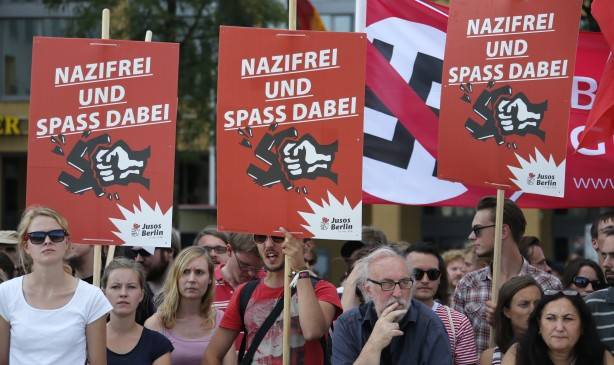Germany’s supreme constitutional court has rejected a proposed ban on a far-right party accused of neo-Nazi links.
The Federal Constitutional Court rejected a historic attempt by all of Germany’s 16 states to outlaw the National Democratic Party (NPD), which has been described by intelligence services as racist and anti-Semitic.
The ban, which was applied for in 2013, would have been the first of its kind since 1956.
It was the second attempt to prohibit the NPD, which officials say violates the constitution of the state that funds it.
It states: “Parties that, by reason of their aims or the behaviour of their adherents, seek to undermine or abolish the free democratic basic order or to endanger the existence of the Federal Republic of Germany shall be unconstitutional.”
The NPD, founded in 1964, calls itself a “patriotic organisation” and openly lists British fascist leader Sir Oswald Mosley among its former supporters.
Its policy opposes “the rising flood of migrants”, the “devastating consequences of globalisation” and multiculturalism and calls integration “genocide”, writing in its manifesto that “Germany must remain the country of Germans”.
The NPD cites both “Americanisation and Islamisation” as risks to national identity and calls for Germany’s exit from both the EU and Nato, while opposing same-sex marriage, equality laws and calling for the castration of convicted paedophiles.
Some of its members have been convicted of Holocaust denial or incitement but the party denies any involvement in violence.
The NPD is highly visible in Germany due to its frequent political rallies, where Nazi symbols and gestures have been reported, but has little official influence.
The party holds a single seat in the European Parliament but is not represented in the German Bundestag and won just 1.3 per cent of the vote in the last national election in 2013.
Its fortunes have declined further since then, losing its last seats in state legislatures in September.
The chance discovery of the National Socialist Underground (NSU) in 2011, blamed for killing nine immigrants and a police officer between 2000 and 2007, prompted politicians to explore a legal ban. The first public hearing took place in March 2016.
Only two parties have been outlawed in West Germany and reunited Germany - the neo-Nazi Socialist Reich Party in 1952 and the German Communist Party in 1956.
Germany's domestic intelligence agency says the NPD, established in 1964, has about 5,000 members, in a country of 82 million, and links to some violent neo-Nazis. Several senior
Heiko Maas, the justice minister, said the verdict would not “take the confrontation with right-wing extremism off our hands”.
“Even if the NPD were banned, that unfortunately does not mean there are no right-wing extremists in Germany,” he told Die Welt.
Some experts argued that allowing the fringe NPD to exist would legitimise it and send a signal that its right-wing views are acceptable, while others warned a ban could be counterproductive and push its members underground.
The first attempted to ban the NPD came in 2003, when the bid was rejected because paid government informants within the party were partially responsible for evidence against it. Officials say there was no evidence from informants this time around.
There are fears over rising support for right-wing groups in Germany, amid tensions over the refugee crisis and a series of terror attacks, as well as mass sexual assaults in Cologne.
The nationalist Alternative for Germany party, which has chipped away the NPD’s support while attacking Angela Merkel opening Germany’s borer to refugees in 2015, has enjoyed unprecedented success in local elections.
Protest movements like the anti-Islam Pegida have drawn thousands of supporters at marches, while asylum centres and mosques have been attacked.
A homemade bomb emblazoned with a swastika was found in the latest plot uncovered, which had links to the neo-Nazi “Oldschool Society” (OSS).
Courtesy The Independent






